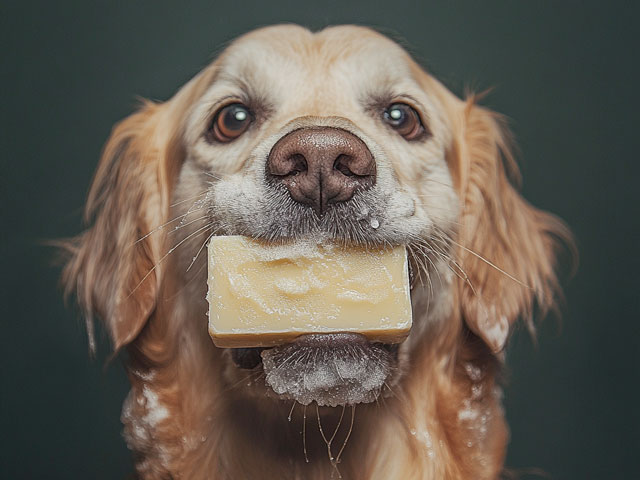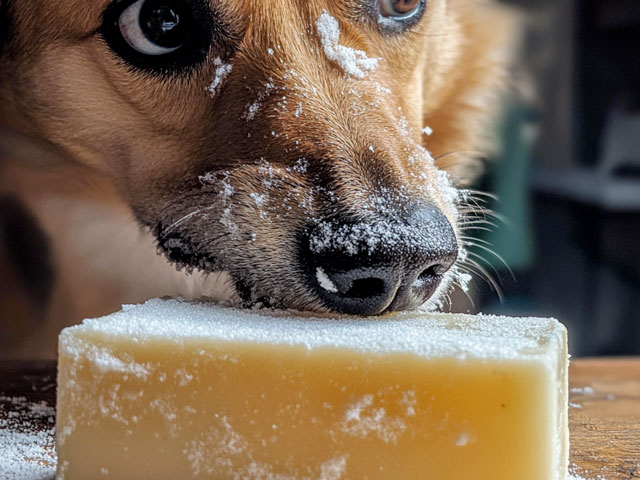What to Do If Your Dog Eats a Bar of Soap

To start, we are not trained veterinarians with experience treating cases of soap ingestion in dogs. We just want to help pet owners understand both the risks and appropriate responses the the steps you should take.
First, let's understand why soap ingestion concerns veterinarians and pet owners alike. Most household soaps contain detergents and chemicals that can irritate your dog's digestive system. Same is true for other pets, but we're focused on your precious pup for now.
When consumed, these substances can cause gastrointestinal upset, though they're typically not life-threatening in small doses. The physical properties of bar soap can also create additional complications, including both choking and as a potential blockage somewhere in the tract. This does not apply to foaming soap.
Learn more about how soap works.
Immediate Steps to Take
When you discover your dog has eaten soap, begin by removing any remaining soap from their reach. Next, try to determine how much soap was consumed and what type it was. Was it bar or foaming? Organic vs Non? What potential ingredients were in it?
For example, there is a big difference between Turmeric Soap and Dawn Dish soap. Dawn might be safe to wash dogs with, but not to consume.
This information will be crucial when you contact your veterinarian. Look at the soap's packaging or take a photo of the ingredients if possible.
Do not attempt to induce vomiting unless specifically instructed by a veterinarian. While it might seem logical to get the soap out of your dog's system, inducing vomiting can sometimes cause more harm than good. The foaming properties of soap can increase the risk of aspiration (inhaling vomit into the lungs).
Instead, encourage your dog to drink fresh water. This helps dilute the soap in their system and can reduce irritation to the digestive tract. However, don't force them to drink excessive amounts.
You don't want to create another problem by "fixing" the first one. You also don't want to leave the dish soap that you were trying to kill fleas with sitting out for Ol Fido to eat.
Monitor your puppy closely for these symptoms:
- Vomiting or retching
- Diarrhea
- Drooling more than usual
- Lethargy or unusual behavior
- Loss of appetite
- Difficulty passing stool
- Abdominal pain or distention
Contact your veterinarian immediately if you observe any of these symptoms, or if your dog consumed a large amount of soap. They may want to examine your pet to ensure there's no blockage or severe irritation.

What Not to Do
I often see pet owners make well-intentioned mistakes under the pressure of helping their pet. Here's what to avoid.
Never give your dog milk or other food to "coat their stomach." This old "remedy" isn't helpful and could make things complicated. The fat in oa bowl of milk might actually increase the absorption of soap molecules.
Also, avoid giving any over-the-counter medications without veterinary guidance. Human medications can be dangerous for dogs and might interact poorly with the soap's ingredients.
Finally, don't wait too long to seek help if your dog shows concerning symptoms. While many cases of soap ingestion resolve on their own, prompt veterinary attention can prevent complications in more serious cases.
Long-term Prevention
After handling the immediate situation, consider preventive measures for the future. Store all soaps, including bar soap, liquid soap, and detergents, in closed cabinets or high shelves out of your dog's reach. Some dogs are attracted to scented products, so be particularly careful with fragranced soaps.
Consider using dog-proof containers in bathrooms and laundry areas. You might also need to address any underlying behavioral issues, such as pica (the tendency to eat non-food items), which could be driving your dog's interest in soap. If your dog is exhibiting a case of pica, you might not want to keep insects and rodents out with Irish Spring. Just saying.
When to Seek Emergency Care
While soap ingestion is often not immediately fatal, there are situations that warrant emergency veterinary care. Seek immediate medical attention if your dog:
- Shows signs of respiratory distress
- Has severe or persistent vomiting
- Appears to be in significant pain
- Shows signs of dehydration
- Has eaten soap containing essential oils or other toxic ingredients
Remember, every dog reacts differently to foreign substances. What causes mild discomfort in one dog might create more serious problems in another. When in doubt, it's always better to consult with your veterinarian rather than wait and see what happens. Prevention is always better than treatment. Keep all household products secured away from your curious canine companion, and don't hesitate to reach out to the pet doc if you suspect there might be a problem.
The TOP 5 Best Dr. Squatch Soaps
Super fans of good ol' Dr. Squatch and their lineup of...